Module 1 How to learn English Unit 3 Language in use 课件35张PPT
文档属性
| 名称 | Module 1 How to learn English Unit 3 Language in use 课件35张PPT |  | |
| 格式 | pptx | ||
| 文件大小 | 22.0MB | ||
| 资源类型 | 试卷 | ||
| 版本资源 | 外研版 | ||
| 科目 | 英语 | ||
| 更新时间 | 2021-08-14 07:28:48 | ||
图片预览


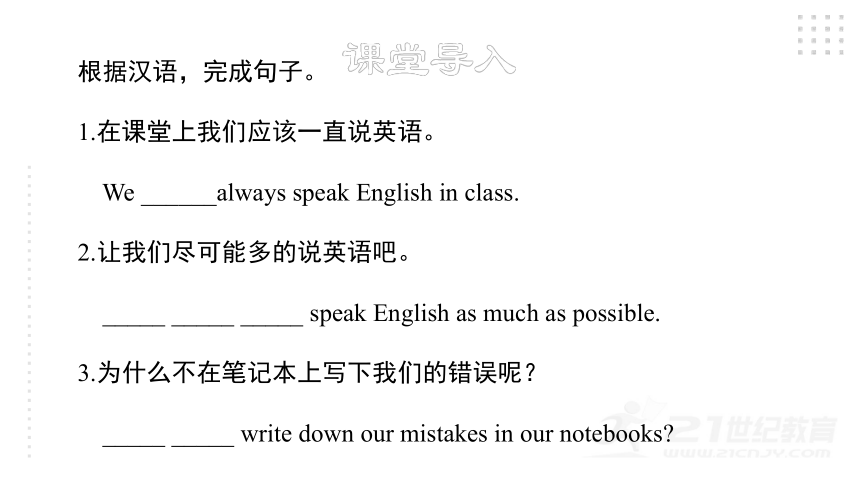
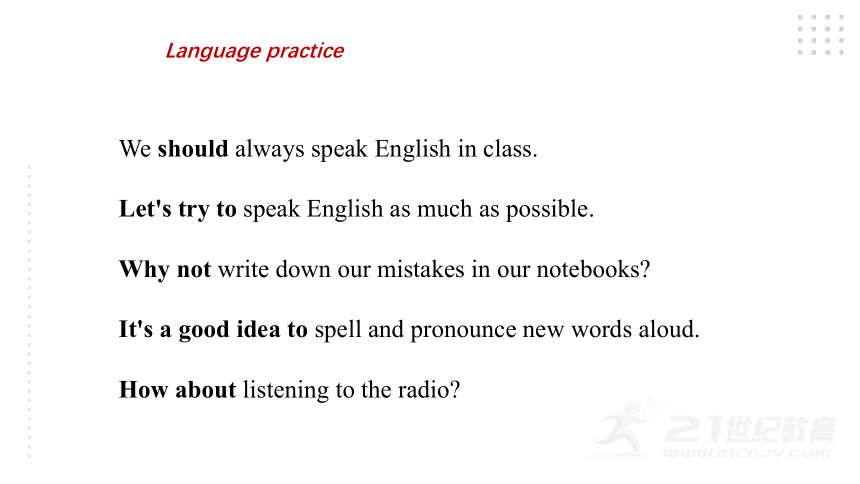
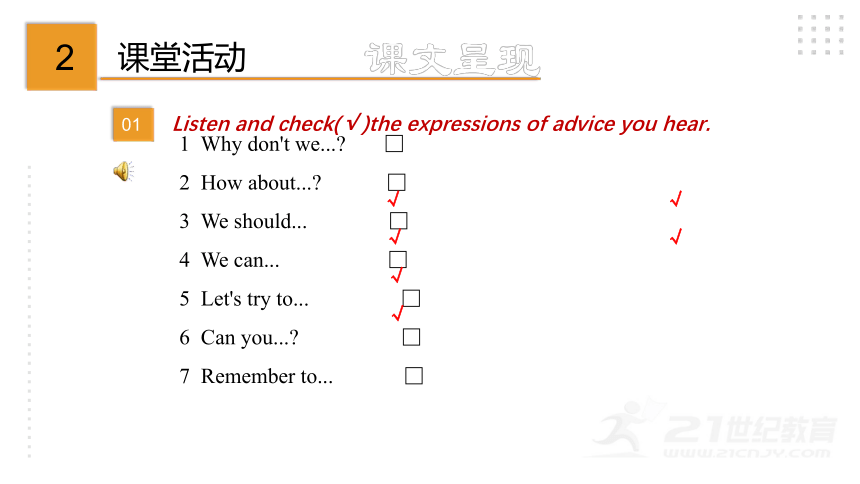
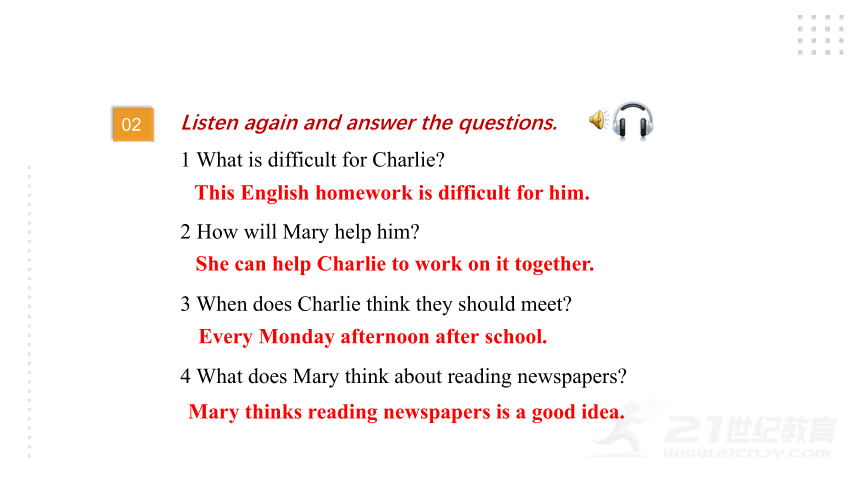
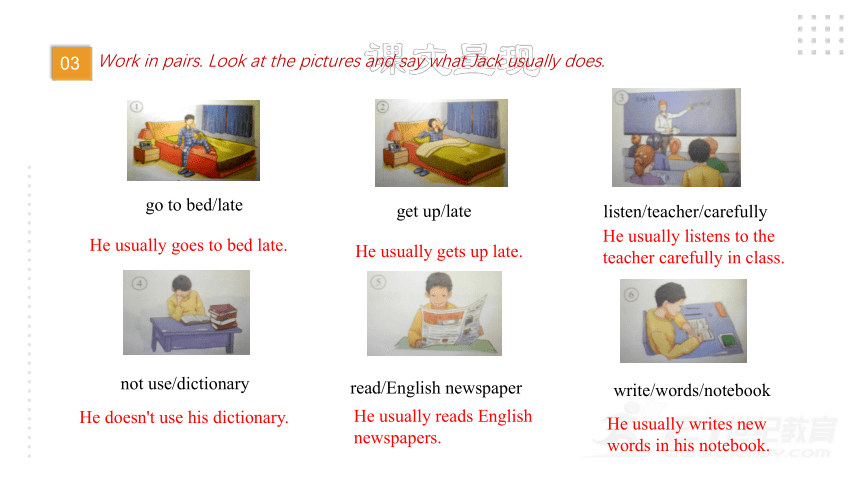
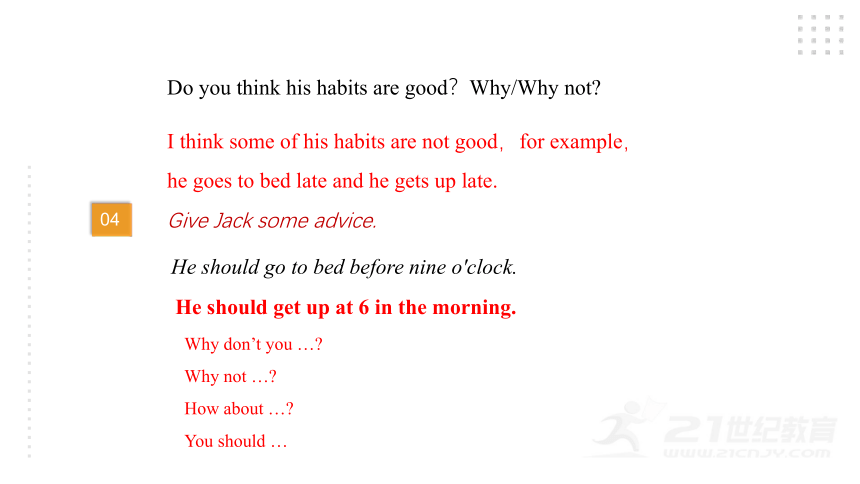
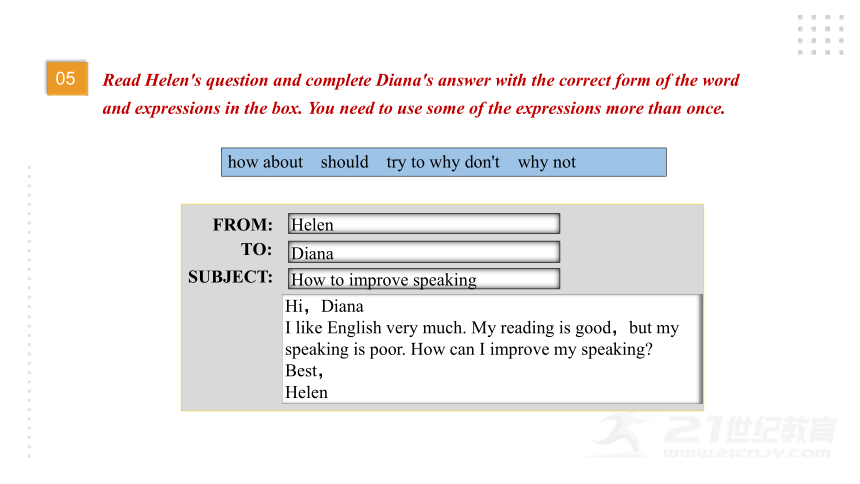

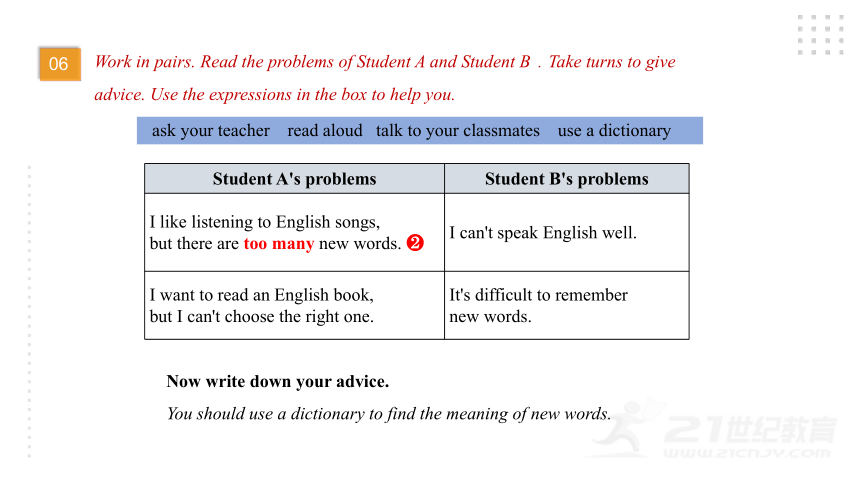
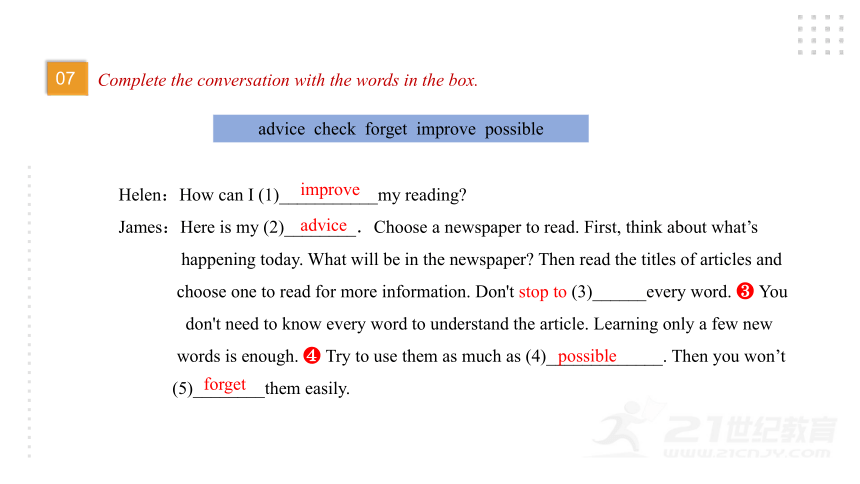
文档简介
英语(外研版)
八年级上册
English
Language in use
Module 1
How to learn English
Unit 3
同学们,上一课学习的单词你们都掌握了吗?现在大家来检验一下,点击下面的音频开始听写吧!
1
课堂导入
Dictation!
根据汉语,完成句子。
1.在课堂上我们应该一直说英语。
We ______always speak English in class.
2.让我们尽可能多的说英语吧。
_____ _____ _____ speak English as much as possible.
3.为什么不在笔记本上写下我们的错误呢?
_____ _____ write down our mistakes in our notebooks?
Language practice
We should always speak English in class.
Let's try to speak English as much as possible.
Why not write down our mistakes in our notebooks??
It's a good idea to spell and pronounce new words aloud.
How about listening to the radio?
1 Why don't we...? □
2 How about...? □
3 We should... □
4 We can... □
5 Let's try to... □
6 Can you...? □
7 Remember to... □
Listen and check(√)the expressions of advice you hear.
√
√
√
√
√
√
01
2
课堂活动
Listen again and answer the questions.
1 What is difficult for Charlie?
2 How will Mary help him?
3 When does Charlie think they should meet?
4 What does Mary think about reading newspapers?
This?English?homework?is?difficult for him.
She can help Charlie to work?on?it?together.
Every?Monday?afternoon?after?school.?
Mary thinks reading newspapers is a good idea.
02
Work in pairs. Look at the pictures and say what Jack usually does.
go to bed/late
get up/late
He usually goes to bed late.
He usually gets up late.
listen/teacher/carefully
He usually listens to the teacher carefully in class.
write/words/notebook
read/English newspaper
He usually reads English newspapers.
He usually writes new words in his notebook.
not use/dictionary
He doesn't use his dictionary.
03
Do you think his habits are good?Why/Why not?
I think some of his habits are not good,for example,he goes to bed late and he gets up late.
Give Jack some advice.
He should go to bed before nine o'clock.
He should get up at 6 in the morning.
04
Why don’t you …?
Why not …?
How about …?
You should …
how about should try to why don't why not
Read Helen's question and complete Diana's answer with the correct form of the word and expressions in the box. You need to use some of the expressions more than once.
Helen
FROM:
SUBJECT:
TO:
Diana
How to improve speaking
Hi,Diana
I like English very much. My reading is good,but my speaking is poor. How can I improve my speaking?
Best,
Helen
05
Diana
FROM:
SUBJECT:
TO:
Helen
Re:How to improve speaking
Hello,Helen,
You need to practise speaking more often. (1)______________ you look for some English-
speaking people in your town?(2)____________saying hello to them and asking them where they come from? (3)___________ make friends with them and take them around your town. ?Is there an English club in your town?If there is not, (4)__________start one with your friends? (5)________________playing a few games and listening to some music?You can watch English films together,and (6)_________speak English all the time. You (7)_________ invite your new English?speaking friends to your club!
?Best,
Diana
Why don't
How about
You can
why not
How about
try to
should
Work in pairs. Read the problems of Student A and Student B.Take turns to give advice. Use the expressions in the box to help you.
ask your teacher read aloud talk to your classmates use a dictionary
06
Now write down your advice.
You should use a dictionary to find the meaning of new words.
Student A's problems
Student B's problems
I like listening to English songs,
but there are too many new words. ?
I can't speak English well.
I want to read an English book,
but I can't choose the right one.
It's difficult to remember
new words.
Complete the conversation with the words in the box.
advice check forget improve possible
Helen:How can I (1)___________my reading?
James:Here is my (2)________.Choose a newspaper to read. First, think about what’s
happening today. What will be in the newspaper? Then read the titles of articles and
choose one to read for more information. Don't stop to (3)______every word. ? You
don't need to know every word to understand the article. Learning only a few new
words is enough. ? Try to use them as much as (4)_____________. Then you won’t
(5)________them easily.
improve
advice
07
possible
forget
Around the world
English online
In addition to English magazines,
newspapers and radio, there are various
kinds of English learning websites. ?
Millions of people around the world
visit them daily to improve their English.
If someone from Spain asks a question, they may get an answer from Canada instantly. On the Internet,you can chat with other English speakers freely, and enjoy the latest English songs.
The Internet brings the world of English to you.
Module task: Making your English study plan
Write down what you are not good at in English.
What I am not good at
.
.
.
.
What I should do
.
.
.
.
speaking,
remembering new words
speak to classmates in English as much as possible,remember eight or ten words every day
Now write down what you should do.
Make an English study plan for this year. Use the information in Activity 8 to help you.
I'm not good at speaking. I should speak to classmates in English as much as possible after class.
I always forget new words,so I should remember eight or ten words every day.
范例:
Work in pairs. Discuss your study plan.
—This is my English study plan. I will listen to English radio programmes every day.
—That's a good idea. You can also listen to some English songs.
范例:
A:This is my English study plan. I'm good at reading,but I'm not good at listening.
B:You should listen to the radio in English every day.
Think about your partner's advice and revise your English study plan.
09
10
11
知识点
1
(3) ________make friends with them and take them around your town.
take sb. around+地点 带着某人参观某地,其同义短语是show sb. around+地点。
eg:Let me take/show you around our school.
让我带你们参观我们的学校。
考向
考点1
take sb. around 带某人参观……
Yesterday afternoon, Linda ____ us _____ her school.
A. took; for B. brought; for
C. took; around D. looked; around
典例
C
考向
修饰可数名词复数,
修饰不可数名词,
修饰形容词或副词
考点2【重点】
too many 的用法
知识点
2
I like listening to English songs, but there are too many new words.
eg:There are too many students in their class. They have too much homework to do, so they are much too tired.
他们班上有太多的学生,他们有太多的作业要做,所以他们太累了。
My cousin is ______ heavy because he often eats _____ fast food.
A. too much; too many B. too many; too much
C. much too; too much D. too much; much too
典例
C
知识点
3
Don’t stop to (3)_____ every word.
考向一
stop to do sth. 停下来去做某事
eg:Let’s stop to have a break.
咱们停下来休息一会儿。
Hearing the doorbell, she stopped to open the door.
听见门铃声,她停下来去开门。
考点3
stop to do sth. 的用法
考向二
stop doing sth. 停止做某事
eg: Hearing the doorbell, she stopped washing the dishes.
听见门铃声,她停止洗碗了。
—Come and see! The baby is crying.
—Please do something to make him _____.
A. stop crying B. stop to cry C. crying D. cry
典例
A
知识点
4
Learning only a few new words is enough.
考向一
修饰可数名词的复数形式
eg:There are a few mistakes in your homework. 你的作业中有一些错误。
考点4
a few 一些
考向三
few, a few, little 与a little的辨析
表示否定意义
表示肯定意义
修饰/ 代指可数名词复数
few
a few
修饰/ 代指不可数名词
little
a little
考向二
few 作代词,表示“很少人(或事物、地方)”
eg:Few of my friends were there. 我的朋友中很少有人在那里。
Few friends are around Tom, so he often feels lonely.
汤姆身边几乎没有朋友,因此他经常感到孤独。
He got up to get some hot water but found there
was _____ left in the bottle.
A. a few B. few C. a little D. little
典例
D
魔法记忆
in addition to 除……之外
后可接名词、代词或v.-ing 形式作宾语
eg:In addition to being a doctor, he is a famous scientist.
他不仅是一名医生,还是一位著名的科学家。
考向一
考点5
知识点
5
In addition to English magazines, newspapers and radio, there are various kinds of English learning websites.
In addition固定短语,意为“此外”。
eg:In addition, it sells nice postcards.
此外,它还出售精美的明信片。
考向二
除英语之外,他还得学第二外语。
________ ___________ ________ English, he has to study a second foreign language.
典例
In addition to
定义及构成
(1)定义:一般现在时表示经常性、习惯性的动作或存在的状态。
(2)构成:一般现在时有两种形式
be动词型:句子的谓语动词是is,am或 are。
eg:She is ten years old.她十岁了。
一般现在时、一般过去时、一般将来时和现在进行时的用法。
语法讲解
一般现在时
考点1
考向1
实义动词型:句中的谓语动词用实义动词,若主语是第三人称单数,谓语动词用第三人称单数形式。
eg:She likes table tennis very much.
她非常喜欢乒乓球。
典例
—According to the timetable, the train _____ at 8:27.—Don’t worry. We can make it.
A. leaves B. is leaving C. is going to leave
A
用法:
(1) 表示经常性或习惯性的动作或存在的状态,常与表示频率的时间状语连用。如:often, sometimes, usually, never, always, once a week, twice a month, every day 等。
eg: I get up at six every morning.
我每天早晨六点起床。
(2)表示客观事实或普遍真理。
eg: The earth goes around the sun.
地球绕着太阳转。
考向2
典例
—What's his brother like?
—He is helpful. He always people in need.
A. helped B. has helped C. helps D. will help
【点拨】由always可知答句表示现在的状态,故用一般现在时。
C
注意时间和条件状语从句中,当主句为将来时态或表示将来意义时,时间和条件状语从句用一般现在时表将来。
eg:I'll write to her when I have time. 我有空会给她写信。
Turn off the lights before you leave. 在你离开之前关灯。
If we hurry, we may catch the bus. 如果抓紧时间,我们可能赶得上公共汽车。
典例
—Do you know if he to play football with us?
—I think he will come if he free tomorrow.
A. comes; is B. comes; will be C. will come; is D. will come; will be
【点拨】考查宾语从句和条件状语从句的时态。问句中if引导的是宾语从句,由于主句为一般现在时,宾语从句的时态根据实际情况确定,根据问句句意“你知道他是否要来和我们一起踢球吗?”可以确定用一般将来时;答语中,if引导的是条件状语从句,在含有条件状语从句的复合句中,其时态根据“主将从现”的原则确定,所以选择答案C。
定义及构成
(1)定义:表示过去某一时间所发生的动作或存在的 状态。
(2)构成:主要有两种形式
①主系(was/were) 表结构。
eg:He was late yesterday.昨天他迟到了。
②主谓( 宾) 结构
eg:I went shopping with my parents yesterday.
昨天我和父母去购物了。
一般过去时
考点2
考向1
魔法记忆
一般过去时并不难,表示过去动作、状态记心间。动词要用过去式,时间状语一般句末站。否定句很简单,didn't 站在动词原形前,其他部分不要变。一般疑问句也好变,did放在句子前,主语、动词原形、其他部分依次站。特殊疑问句也简单,疑问词加一般疑问句记心间。最后一条请注意,动词过去式要牢记。
用法:常与一般过去时连用的时间状语有:yesterday, last night, just now, ten years ago, at that time, in the past, in 2008 等。
表示在过去的某个时间里发生的动作或存在的状态。
eg:I visited the Great Wall last weekend. 上周末我参观了长城。
表示在过去的一段时间内经常性或习惯性的动作。
eg:When I was young,I was afraid of dogs. 我小时候怕狗。
考向2
典例
—Wendy, how long have you had the Huawei P30 Pro?
—A couple of days. I ____ it last week.
A. bought B. buy C. will buy D. have bought
【点拨】句意为“——温迪,你买华为P40 Pro多久了?——几天。我上周买的”。根据答句时间状语last week 提示,可以确定该句是一般过去时。
A
定义及构成
(1)定义:表示在将来的某个时间或某段时间里将要发生的动作或存在的状态。
(2)构成:主要有两种形式:be going to+动词原形; will或shall+动词原形。
一般将来时
考点3
考向1
典例
—What is your plan for next weekend, Lingling?
—I _____ volunteer work in the museum.
A. was doing B. did
C. have done D. am going to do
【点拨】根据问句可知,答语描述的是将来计划打算进行的动作,因此用一般将来时。
D
用法:
(1)be going to表示计划、打算做某事,还可表示“预见”,即现在已有迹象表明将要发生或即将发生 某种情况。
eg:We are going to see Mr Green. 我们打算去看望格林先生。
Look at the clouds—it's going to rain.看那些云,要下雨了。
考向2
(2)will或shall+动词原形,will用于第一、二、三人称,当主语是第一人称时,
还可以用shall。
eg:They will leave for Beijing tomorrow. 明天他们将出发去北京。
询问对方的意愿或表示邀请或命令时,只能用will或shall。
eg:Will you please turn off the TV. 你可以关掉电视吗?
(3)当动词具有明显的方向性时,如:come,go,leave等,可以用be+doing来替换be going to。
eg:We are leaving at six. 我们将在六点离开。
(4)be+about+to do 也可以表示将要发生的动作,后面一般不跟时间状语。
eg:We are about to leave . 我们要走了。
(5) 与tomorrow, next week, in the future 等连用。
eg: I will go to school tomorrow.我明天将去上学。
典例
Next week, each student in the class _____ a small gift from their teachers.
A. receives B. received
C. will receive D. has received
C
定义及构成
(1)定义:表示现在或目前正在进行或发生的动作。
(2)构成:be+动词的现在分词。
eg:I am watching TV. 我正在看电视。
现在进行时
考点4
考向1
用法:表示现在正在发生的动作。
表示现阶段正在进行的动作或持续的状态,常与now, at the moment, these days 等时间状语连用。
eg:Mr Wang is writing a book these days.王先生这些天正在写一本书。
考向2
典例
Listen! The birds _____ in the trees outside our hotel.
A. sing B. are singing C. sang D. were singing
【点拨】当句中含有Look/Listen! 时,句子应用现在进行时。
B
3
课堂小结
1. We have reviewed 4 tenses: the simple present tense, the simple past tense, the simple future
tense, the present continuous tense
2. We have learnt how to ask for or give some advice
一、选词填空(注意大小写)
1. _________________ his movie work, Jackie Chan is known as a philanthropist(慈善家).
2. If you come to visit my home town, I can ___________ you ______________.
3. I have little time today, but I can come again in ___________ days.
In addition to
show around
{5C22544A-7EE6-4342-B048-85BDC9FD1C3A}various kinds of, a few, look for, in addition to, show…around
4. There are ____________________ birds in the forest.
5. Peter is ____________ his model plane. He doesn’t know where it is.
various kinds of
looking for
A few
4
课堂训练
二、语法专练
6. The world is changing with every second; and China, too, _______ with every second.
A. is changing B. had changed C. changed
A
7. —Jeff, could you tell me if it ______ tomorrow? If it ______ tomorrow, I will stay at home.
—It’s reported that it will be sunny; let’s go camping on the Fenghuang Mountain.
A. rain; rain B. rains; rains C. will rain; rains D. will rain; will rain
C
8. —May I speak to Mrs. Smith? —Sorry, she ______ the clothes.
A. is washing B. washes C. wash
A
9. — Hurry up!
—One moment. I _____ my e-mails and then I’m ready to go.
A. read B. am reading C. was reading D. have read
B
10. —You’d better take an umbrella. The weather report says it _____ in the afternoon.
—Thank you. I will put one in my bag.
A. will rain B. rains C. is raining
A
https://www.21cnjy.com/help/help_extract.php
八年级上册
English
Language in use
Module 1
How to learn English
Unit 3
同学们,上一课学习的单词你们都掌握了吗?现在大家来检验一下,点击下面的音频开始听写吧!
1
课堂导入
Dictation!
根据汉语,完成句子。
1.在课堂上我们应该一直说英语。
We ______always speak English in class.
2.让我们尽可能多的说英语吧。
_____ _____ _____ speak English as much as possible.
3.为什么不在笔记本上写下我们的错误呢?
_____ _____ write down our mistakes in our notebooks?
Language practice
We should always speak English in class.
Let's try to speak English as much as possible.
Why not write down our mistakes in our notebooks??
It's a good idea to spell and pronounce new words aloud.
How about listening to the radio?
1 Why don't we...? □
2 How about...? □
3 We should... □
4 We can... □
5 Let's try to... □
6 Can you...? □
7 Remember to... □
Listen and check(√)the expressions of advice you hear.
√
√
√
√
√
√
01
2
课堂活动
Listen again and answer the questions.
1 What is difficult for Charlie?
2 How will Mary help him?
3 When does Charlie think they should meet?
4 What does Mary think about reading newspapers?
This?English?homework?is?difficult for him.
She can help Charlie to work?on?it?together.
Every?Monday?afternoon?after?school.?
Mary thinks reading newspapers is a good idea.
02
Work in pairs. Look at the pictures and say what Jack usually does.
go to bed/late
get up/late
He usually goes to bed late.
He usually gets up late.
listen/teacher/carefully
He usually listens to the teacher carefully in class.
write/words/notebook
read/English newspaper
He usually reads English newspapers.
He usually writes new words in his notebook.
not use/dictionary
He doesn't use his dictionary.
03
Do you think his habits are good?Why/Why not?
I think some of his habits are not good,for example,he goes to bed late and he gets up late.
Give Jack some advice.
He should go to bed before nine o'clock.
He should get up at 6 in the morning.
04
Why don’t you …?
Why not …?
How about …?
You should …
how about should try to why don't why not
Read Helen's question and complete Diana's answer with the correct form of the word and expressions in the box. You need to use some of the expressions more than once.
Helen
FROM:
SUBJECT:
TO:
Diana
How to improve speaking
Hi,Diana
I like English very much. My reading is good,but my speaking is poor. How can I improve my speaking?
Best,
Helen
05
Diana
FROM:
SUBJECT:
TO:
Helen
Re:How to improve speaking
Hello,Helen,
You need to practise speaking more often. (1)______________ you look for some English-
speaking people in your town?(2)____________saying hello to them and asking them where they come from? (3)___________ make friends with them and take them around your town. ?Is there an English club in your town?If there is not, (4)__________start one with your friends? (5)________________playing a few games and listening to some music?You can watch English films together,and (6)_________speak English all the time. You (7)_________ invite your new English?speaking friends to your club!
?Best,
Diana
Why don't
How about
You can
why not
How about
try to
should
Work in pairs. Read the problems of Student A and Student B.Take turns to give advice. Use the expressions in the box to help you.
ask your teacher read aloud talk to your classmates use a dictionary
06
Now write down your advice.
You should use a dictionary to find the meaning of new words.
Student A's problems
Student B's problems
I like listening to English songs,
but there are too many new words. ?
I can't speak English well.
I want to read an English book,
but I can't choose the right one.
It's difficult to remember
new words.
Complete the conversation with the words in the box.
advice check forget improve possible
Helen:How can I (1)___________my reading?
James:Here is my (2)________.Choose a newspaper to read. First, think about what’s
happening today. What will be in the newspaper? Then read the titles of articles and
choose one to read for more information. Don't stop to (3)______every word. ? You
don't need to know every word to understand the article. Learning only a few new
words is enough. ? Try to use them as much as (4)_____________. Then you won’t
(5)________them easily.
improve
advice
07
possible
forget
Around the world
English online
In addition to English magazines,
newspapers and radio, there are various
kinds of English learning websites. ?
Millions of people around the world
visit them daily to improve their English.
If someone from Spain asks a question, they may get an answer from Canada instantly. On the Internet,you can chat with other English speakers freely, and enjoy the latest English songs.
The Internet brings the world of English to you.
Module task: Making your English study plan
Write down what you are not good at in English.
What I am not good at
.
.
.
.
What I should do
.
.
.
.
speaking,
remembering new words
speak to classmates in English as much as possible,remember eight or ten words every day
Now write down what you should do.
Make an English study plan for this year. Use the information in Activity 8 to help you.
I'm not good at speaking. I should speak to classmates in English as much as possible after class.
I always forget new words,so I should remember eight or ten words every day.
范例:
Work in pairs. Discuss your study plan.
—This is my English study plan. I will listen to English radio programmes every day.
—That's a good idea. You can also listen to some English songs.
范例:
A:This is my English study plan. I'm good at reading,but I'm not good at listening.
B:You should listen to the radio in English every day.
Think about your partner's advice and revise your English study plan.
09
10
11
知识点
1
(3) ________make friends with them and take them around your town.
take sb. around+地点 带着某人参观某地,其同义短语是show sb. around+地点。
eg:Let me take/show you around our school.
让我带你们参观我们的学校。
考向
考点1
take sb. around 带某人参观……
Yesterday afternoon, Linda ____ us _____ her school.
A. took; for B. brought; for
C. took; around D. looked; around
典例
C
考向
修饰可数名词复数,
修饰不可数名词,
修饰形容词或副词
考点2【重点】
too many 的用法
知识点
2
I like listening to English songs, but there are too many new words.
eg:There are too many students in their class. They have too much homework to do, so they are much too tired.
他们班上有太多的学生,他们有太多的作业要做,所以他们太累了。
My cousin is ______ heavy because he often eats _____ fast food.
A. too much; too many B. too many; too much
C. much too; too much D. too much; much too
典例
C
知识点
3
Don’t stop to (3)_____ every word.
考向一
stop to do sth. 停下来去做某事
eg:Let’s stop to have a break.
咱们停下来休息一会儿。
Hearing the doorbell, she stopped to open the door.
听见门铃声,她停下来去开门。
考点3
stop to do sth. 的用法
考向二
stop doing sth. 停止做某事
eg: Hearing the doorbell, she stopped washing the dishes.
听见门铃声,她停止洗碗了。
—Come and see! The baby is crying.
—Please do something to make him _____.
A. stop crying B. stop to cry C. crying D. cry
典例
A
知识点
4
Learning only a few new words is enough.
考向一
修饰可数名词的复数形式
eg:There are a few mistakes in your homework. 你的作业中有一些错误。
考点4
a few 一些
考向三
few, a few, little 与a little的辨析
表示否定意义
表示肯定意义
修饰/ 代指可数名词复数
few
a few
修饰/ 代指不可数名词
little
a little
考向二
few 作代词,表示“很少人(或事物、地方)”
eg:Few of my friends were there. 我的朋友中很少有人在那里。
Few friends are around Tom, so he often feels lonely.
汤姆身边几乎没有朋友,因此他经常感到孤独。
He got up to get some hot water but found there
was _____ left in the bottle.
A. a few B. few C. a little D. little
典例
D
魔法记忆
in addition to 除……之外
后可接名词、代词或v.-ing 形式作宾语
eg:In addition to being a doctor, he is a famous scientist.
他不仅是一名医生,还是一位著名的科学家。
考向一
考点5
知识点
5
In addition to English magazines, newspapers and radio, there are various kinds of English learning websites.
In addition固定短语,意为“此外”。
eg:In addition, it sells nice postcards.
此外,它还出售精美的明信片。
考向二
除英语之外,他还得学第二外语。
________ ___________ ________ English, he has to study a second foreign language.
典例
In addition to
定义及构成
(1)定义:一般现在时表示经常性、习惯性的动作或存在的状态。
(2)构成:一般现在时有两种形式
be动词型:句子的谓语动词是is,am或 are。
eg:She is ten years old.她十岁了。
一般现在时、一般过去时、一般将来时和现在进行时的用法。
语法讲解
一般现在时
考点1
考向1
实义动词型:句中的谓语动词用实义动词,若主语是第三人称单数,谓语动词用第三人称单数形式。
eg:She likes table tennis very much.
她非常喜欢乒乓球。
典例
—According to the timetable, the train _____ at 8:27.—Don’t worry. We can make it.
A. leaves B. is leaving C. is going to leave
A
用法:
(1) 表示经常性或习惯性的动作或存在的状态,常与表示频率的时间状语连用。如:often, sometimes, usually, never, always, once a week, twice a month, every day 等。
eg: I get up at six every morning.
我每天早晨六点起床。
(2)表示客观事实或普遍真理。
eg: The earth goes around the sun.
地球绕着太阳转。
考向2
典例
—What's his brother like?
—He is helpful. He always people in need.
A. helped B. has helped C. helps D. will help
【点拨】由always可知答句表示现在的状态,故用一般现在时。
C
注意时间和条件状语从句中,当主句为将来时态或表示将来意义时,时间和条件状语从句用一般现在时表将来。
eg:I'll write to her when I have time. 我有空会给她写信。
Turn off the lights before you leave. 在你离开之前关灯。
If we hurry, we may catch the bus. 如果抓紧时间,我们可能赶得上公共汽车。
典例
—Do you know if he to play football with us?
—I think he will come if he free tomorrow.
A. comes; is B. comes; will be C. will come; is D. will come; will be
【点拨】考查宾语从句和条件状语从句的时态。问句中if引导的是宾语从句,由于主句为一般现在时,宾语从句的时态根据实际情况确定,根据问句句意“你知道他是否要来和我们一起踢球吗?”可以确定用一般将来时;答语中,if引导的是条件状语从句,在含有条件状语从句的复合句中,其时态根据“主将从现”的原则确定,所以选择答案C。
定义及构成
(1)定义:表示过去某一时间所发生的动作或存在的 状态。
(2)构成:主要有两种形式
①主系(was/were) 表结构。
eg:He was late yesterday.昨天他迟到了。
②主谓( 宾) 结构
eg:I went shopping with my parents yesterday.
昨天我和父母去购物了。
一般过去时
考点2
考向1
魔法记忆
一般过去时并不难,表示过去动作、状态记心间。动词要用过去式,时间状语一般句末站。否定句很简单,didn't 站在动词原形前,其他部分不要变。一般疑问句也好变,did放在句子前,主语、动词原形、其他部分依次站。特殊疑问句也简单,疑问词加一般疑问句记心间。最后一条请注意,动词过去式要牢记。
用法:常与一般过去时连用的时间状语有:yesterday, last night, just now, ten years ago, at that time, in the past, in 2008 等。
表示在过去的某个时间里发生的动作或存在的状态。
eg:I visited the Great Wall last weekend. 上周末我参观了长城。
表示在过去的一段时间内经常性或习惯性的动作。
eg:When I was young,I was afraid of dogs. 我小时候怕狗。
考向2
典例
—Wendy, how long have you had the Huawei P30 Pro?
—A couple of days. I ____ it last week.
A. bought B. buy C. will buy D. have bought
【点拨】句意为“——温迪,你买华为P40 Pro多久了?——几天。我上周买的”。根据答句时间状语last week 提示,可以确定该句是一般过去时。
A
定义及构成
(1)定义:表示在将来的某个时间或某段时间里将要发生的动作或存在的状态。
(2)构成:主要有两种形式:be going to+动词原形; will或shall+动词原形。
一般将来时
考点3
考向1
典例
—What is your plan for next weekend, Lingling?
—I _____ volunteer work in the museum.
A. was doing B. did
C. have done D. am going to do
【点拨】根据问句可知,答语描述的是将来计划打算进行的动作,因此用一般将来时。
D
用法:
(1)be going to表示计划、打算做某事,还可表示“预见”,即现在已有迹象表明将要发生或即将发生 某种情况。
eg:We are going to see Mr Green. 我们打算去看望格林先生。
Look at the clouds—it's going to rain.看那些云,要下雨了。
考向2
(2)will或shall+动词原形,will用于第一、二、三人称,当主语是第一人称时,
还可以用shall。
eg:They will leave for Beijing tomorrow. 明天他们将出发去北京。
询问对方的意愿或表示邀请或命令时,只能用will或shall。
eg:Will you please turn off the TV. 你可以关掉电视吗?
(3)当动词具有明显的方向性时,如:come,go,leave等,可以用be+doing来替换be going to。
eg:We are leaving at six. 我们将在六点离开。
(4)be+about+to do 也可以表示将要发生的动作,后面一般不跟时间状语。
eg:We are about to leave . 我们要走了。
(5) 与tomorrow, next week, in the future 等连用。
eg: I will go to school tomorrow.我明天将去上学。
典例
Next week, each student in the class _____ a small gift from their teachers.
A. receives B. received
C. will receive D. has received
C
定义及构成
(1)定义:表示现在或目前正在进行或发生的动作。
(2)构成:be+动词的现在分词。
eg:I am watching TV. 我正在看电视。
现在进行时
考点4
考向1
用法:表示现在正在发生的动作。
表示现阶段正在进行的动作或持续的状态,常与now, at the moment, these days 等时间状语连用。
eg:Mr Wang is writing a book these days.王先生这些天正在写一本书。
考向2
典例
Listen! The birds _____ in the trees outside our hotel.
A. sing B. are singing C. sang D. were singing
【点拨】当句中含有Look/Listen! 时,句子应用现在进行时。
B
3
课堂小结
1. We have reviewed 4 tenses: the simple present tense, the simple past tense, the simple future
tense, the present continuous tense
2. We have learnt how to ask for or give some advice
一、选词填空(注意大小写)
1. _________________ his movie work, Jackie Chan is known as a philanthropist(慈善家).
2. If you come to visit my home town, I can ___________ you ______________.
3. I have little time today, but I can come again in ___________ days.
In addition to
show around
{5C22544A-7EE6-4342-B048-85BDC9FD1C3A}various kinds of, a few, look for, in addition to, show…around
4. There are ____________________ birds in the forest.
5. Peter is ____________ his model plane. He doesn’t know where it is.
various kinds of
looking for
A few
4
课堂训练
二、语法专练
6. The world is changing with every second; and China, too, _______ with every second.
A. is changing B. had changed C. changed
A
7. —Jeff, could you tell me if it ______ tomorrow? If it ______ tomorrow, I will stay at home.
—It’s reported that it will be sunny; let’s go camping on the Fenghuang Mountain.
A. rain; rain B. rains; rains C. will rain; rains D. will rain; will rain
C
8. —May I speak to Mrs. Smith? —Sorry, she ______ the clothes.
A. is washing B. washes C. wash
A
9. — Hurry up!
—One moment. I _____ my e-mails and then I’m ready to go.
A. read B. am reading C. was reading D. have read
B
10. —You’d better take an umbrella. The weather report says it _____ in the afternoon.
—Thank you. I will put one in my bag.
A. will rain B. rains C. is raining
A
https://www.21cnjy.com/help/help_extract.php
同课章节目录
- Module 1 How to learn English
- Unit 1 Let's try to speak English as much as possi
- Unit 2 You should smile at her.
- Unit 3 Language in use .
- Module 2 My home town and my country
- Unit 1 It's taller than many other buildings.
- Unit 2 Cambridge is a beautiful city in the east o
- Unit 3 Language in use .
- Module 3 Sports.
- Unit 1 Nothing is more exciting than playing tenni
- Unit 2 This year we training more carefully.
- Unit 3 Language in use .
- Module 4 Planes, ships and trains .
- Unit 1 He lives the farthest from school.
- Unit 2 What is the best way to travel.
- Unit 3 Language in use .
- Module 5 Lao She Teahouse.
- Unit 1 I wanted to see the Beijing Opera.
- Unit 2 It descibes the changes in Chinese society.
- Unit 3 Language in use .
- Module 6 Animals in danger.
- Unit 1 It allows people to get closer to them .
- Unit 2 The WWF is working hard to save them all.
- Unit 3 Language in use .
- Revision module A
- Module 7 A famous story
- Unit 1 Alice was sitting with her sister by the ri
- Unit 2 She was thinking about her cat.
- Unit 3 Language in use .
- Module 8 Accidents
- Unit 1 While the car were changing to red, a car s
- Unit 2 I was trying to pick it up when it bite me
- Unit 3 Language in use .
- Module 9 Population
- Unit 1 The population of China is about 1.37 billi
- Unit 2 Arnwick was a city with 200,000 people.
- Unit 3 Language in use .
- Module 10 The weathe
- Unit 1 It might snow.
- Unit 2 The weather is fine all year round.
- Unit 3 Language in use .
- Module 11 Way of life
- Unit 1 In China ,we open a gift later.
- Unit 2 In England, you usually drink tea with milk
- Unit 3 Language in use .
- Module 12 Help
- Unit 1 What should we do before help arrives?
- Unit 2 Stay away from windows and heavy furniture.
- Unit 3 Language in use .
- Revision module B
